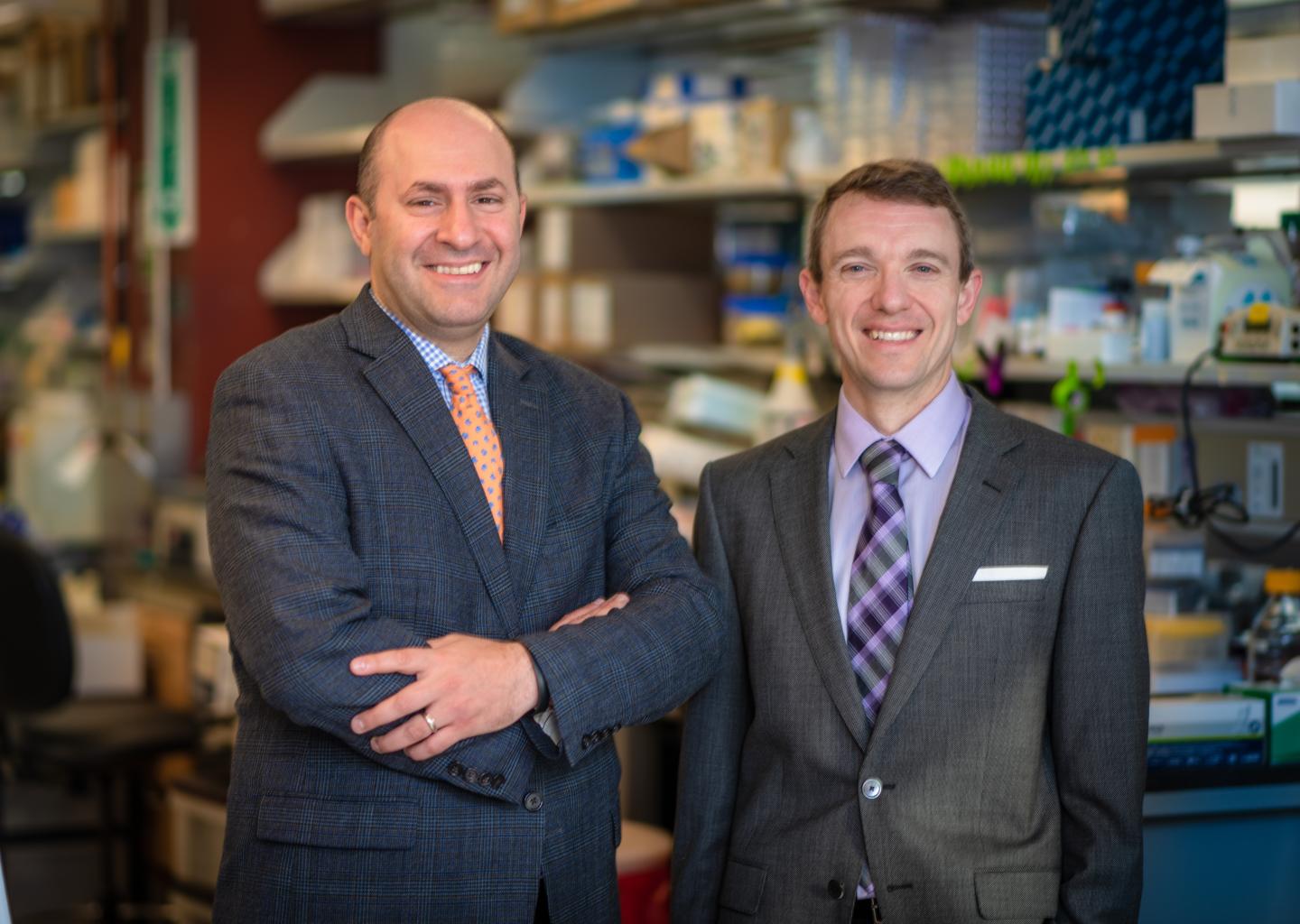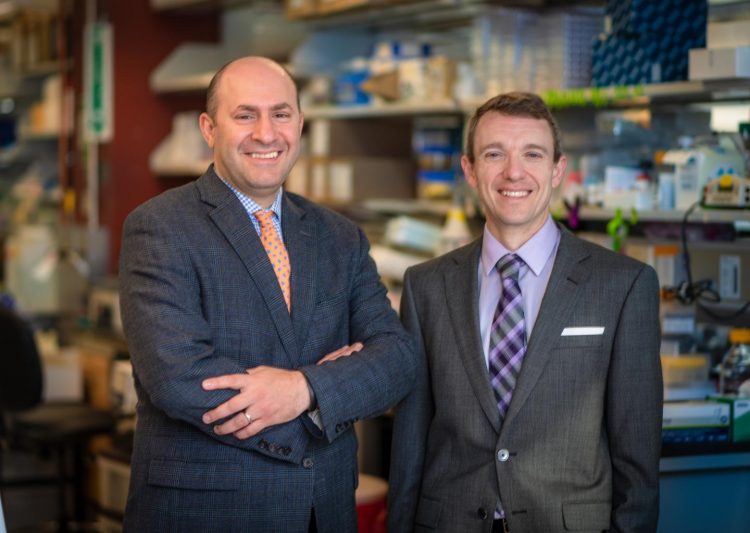
Credit: Dana-Farber Cancer Institute
- Cancer cells appear to adapt to treatment with checkpoint blocker drugs by altering a metabolic process, leading to shorter survival for patients
- The findings could help identify patients who might benefit from combination therapy with a checkpoint blocker and another inhibitor
BOSTON — A metabolic imbalance in some cancer patients following treatment with a checkpoint inhibitor drug, nivolumab, is associated with resistance to the immunotherapy agent and shorter survival, report scientists from Dana-Farber Cancer Institute, in collaborative work with the Broad Institute of MIT and Harvard.
The chemical change, which the investigators say reflects an “adaptive resistance mechanism” by cancer cells or the immune system in response to treatment with the PD-1 antibody drug nivolumab, was linked to worse survival in patients with advanced melanoma and kidney cancer. The greater the change – the conversion of the amino acid tryptophan to a metabolite called kynurenine – the larger the impact on survival.
“The main message is that metabolic adaptations in cancer immunotherapy may be relevant after immune checkpoint blockade,” said Toni K. Choueiri, MD, co-senior author of the paper with Marios Giannakis, MD, PhD. Their report is published in Nature Communications. Metabolic processes are those chemical reactions in the body necessary to sustain life, such as the conversion of food to energy to run cellular processes.
Checkpoint blockers such as nivolumab are drugs that release the molecular brakes on the immune response that cancer often uses to escape attack by immune T cells. One such molecular brake is known as PD-1. In some patients and some cancer types the drugs have proven highly effective in unleashing the T cell attack on tumors, but overall, the drugs help only a minority of patients. “One of the most important questions in oncology is who responds and who doesn’t to modern PD-1 inhibitors,” said Choueiri, Director of the Lank Center for Genitourinary Oncology at Dana-Farber.
Scientists have studied cancer tissue specimens to look for factors that may be associated with greater or lesser effect of checkpoint inhibitors: among them are the number of cancer-related mutations found in the tumors’ DNA, and other genetic “signatures” associated with response to checkpoint blockers. The metabolic alteration the scientists found in the current study could be measured in the bloodstream – a significant advantage over tissue-based tests.
“This is an attractive option for identifying biomarkers of metabolic changes” related to treatment with checkpoint blockers, said Giannakis, assistant professor of medicine at Dana-Farber and Harvard Medical School. “We know that metabolism is important in immunity, and kynurenine [the chemical found to be elevated in a majority of the patients treated with nivolumab] is known to be immunosuppressive.”
In this study, the researchers analyzed blood samples from three independent immunotherapy trials and measured changes in metabolites [chemicals involved in metabolic reactions] before treatment started and at several points during treatment. In melanoma patients, 78% had increases in the tryptophan to kynurenine conversion and 26.5% had increases of greater than 50% at week four of treatment. In the kidney cancer patients, nivolumab treatment was also associated with increases in kynurenine.
The analysis showed that melanoma and kidney cancer patients with higher levels of tryptophan to kynurenine conversion on nivolumab had worse survival: In particular, individuals with melanoma whose blood tests showed a greater than 50% increase in the kynurenine and tryptophan ratio had a median survival of 15.7 months, while those with decreases in this ratio had a median survival time of more than 39 months whereas the respective number for patients with kidney cancer were 16.7 versus 31.3 months.
Exactly how treatment with PD-1 checkpoint blockers causes tryptophan to be converted to kynurenine isn’t known. However, an enzyme known as IDO, which has been implicated in many forms of cancer, plays a major role in synthesizing kynurenine from tryptophan. The Dana-Farber researchers noted that a randomized clinical trial in which advanced melanoma patients were treated with IDO inhibitors alone did not yield positive results. However, that study did not look at the kynurenine levels of these patients. The researchers said their results suggest that combining checkpoint blockers with IDO inhibitors might “benefit a selected group of patients with checkpoint-inhibition-triggered kynurenine pathway activation.”
###
Funding for this study was provided by: Conquer Cancer Foundation ASCO Career Development Award, Stand Up To Cancer Colorectal Cancer Dream Team Translational Research Grant (grant number: SU2C-AACR-DT22-17), the NCI’s Cancer Target
Discovery and Development (CTD2) Network (grant number U01CA217848), Kidney SPORE P50CA101942-12, and the Trust Family, Michael Brigham, and Loker Pinard Funds for Kidney Cancer Research at Dana-Farber Cancer Institute. This research was also supported by the BMS II-ON consortium and the AACR KureIt Grant for Kidney Cancer. Giannakis and Choueiri have pending patents for biomarkers of immune checkpoint blockers. Giannakis receives research funding from Bristol Myers-Squibb and Merck. Choueiri’s disclosures include receiving research funds from AstraZeneca, Bayer, BMS, Cerulean, Eisai, Foundation Medicine Inc., Exelixis, Ipsen, Tracon, Genentech, Roche, Roche Products Limited, GlaxoSmithKline, Merck, Novartis, Peloton, Pfizer, Prometheus Labs, Corvus, Calithera, Analysis Group, Takeda. T. as well as a consulting or advisory role for AstraZeneca, Alexion, Sanofi/Aventis, Bayer, BMS, Cerulean, Eisai, Foundation Medicine Inc., Exelixis, Genentech, Heron Therapeutics, Roche, GlaxoSmithKline, Merck, Novartis, Peloton, Pfizer, EMD Serono, Prometheus Labs, Corvus, Ipsen, Up-to-Date, NCCN, Analysis Group.
Media Contact
Victoria Warren
[email protected]
Original Source
https:/
Related Journal Article
http://dx.





